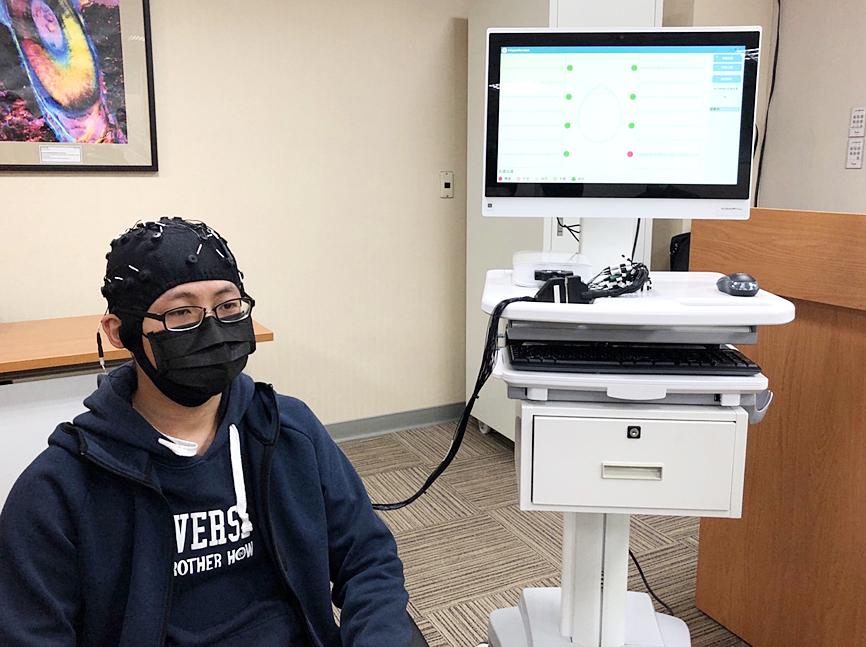Taiwanese scientists have developed an artificial intelligence (AI) application that utilizes electroencephalography (EEG) signals to spot mild cognitive impairments that often occur before dementia is diagnosed.
The Ministry of Science and Technology on Wednesday said that the diagnosis system is used for the accurate and rapid screening of mild cognitive impairments and ensuing Alzheimer’s disease-induced dementia
The tool — which has a 92 percent accuracy — was developed by National Taiwan University of Science and Technology and HippoScreen Neurotech Corp in a ministry-funded program, the ministry told a news conference in Taipei, adding that it funded the research.

Photo: CNA
Lead researcher Liu Yi-hung (劉益宏), a professor of mechanical engineering at the university and founder of HippoScreen, said that the EEG signal patterns of people with mild cognitive impairments are less complex than those of healthy people.
The decreased complexity of EEG signals corresponds with increasing communication difficulties, he said.
Researchers developed algorithms to decipher, classify and interpret EEG signals with regard to signs of impending dementia, he said.
The researchers used EEG data from 80 study participants, he said, adding that the results were published in multiple peer-reviewed academic journals, including the International Journal of Fuzzy Systems, he said.
The technology — which would be available to health professionals as a cloud-based service — would help doctors diagnose mild cognitive impairments within 40 seconds of uploading an EEG reading to the server, he said.
The researchers are working on a follow-up program to improve the system, with the goal to collect EEG readings from 500 participants before the end of June next year, he said.
The research team’s partners in the next phase of testing include National Taiwan University Hospital, Tri-Service General Hospital, Taipei Veterans General Hospital and Chang Gung Memorial Hospital, he said.
The Food and Drug Administration and its US counterpart have approved the technology, which would become available to medical professionals in the second half of next year, he said.
Tsai Chia-fen (蔡佳芬), a psychiatrist at Taipei Veterans General Hospital, said that 15 to 20 percent of people with mild cognitive impairments later developed Alzheimer’s-induced dementia.
The new tool would help assess dementia risks in older people at risk of the disease, she added.
The system’s underlying technologies have the potential for further development and application in treating other conditions, including depression and drug addiction, said Chen Chih-ken (陳志根), a psychiatrist at Chang Gung Memorial Hospital’s Keelung branch.

Taiwan has received more than US$70 million in royalties as of the end of last year from developing the F-16V jet as countries worldwide purchase or upgrade to this popular model, government and military officials said on Saturday. Taiwan funded the development of the F-16V jet and ended up the sole investor as other countries withdrew from the program. Now the F-16V is increasingly popular and countries must pay Taiwan a percentage in royalties when they purchase new F-16V aircraft or upgrade older F-16 models. The next five years are expected to be the peak for these royalties, with Taiwan potentially earning

STAY IN YOUR LANE: As the US and Israel attack Iran, the ministry has warned China not to overstep by including Taiwanese citizens in its evacuation orders The Ministry of Foreign Affairs (MOFA) yesterday rebuked a statement by China’s embassy in Israel that it would evacuate Taiwanese holders of Chinese travel documents from Israel amid the latter’s escalating conflict with Iran. Tensions have risen across the Middle East in the wake of US and Israeli airstrikes on Iran beginning Saturday. China subsequently issued an evacuation notice for its citizens. In a news release, the Chinese embassy in Israel said holders of “Taiwan compatriot permits (台胞證)” issued to Taiwanese nationals by Chinese authorities for travel to China — could register for evacuation to Egypt. In Taipei, the ministry yesterday said Taiwan

Taiwan is awaiting official notification from the US regarding the status of the Agreement on Reciprocal Trade (ART) after the US Supreme Court ruled US President Donald Trump's global tariffs unconstitutional. Speaking to reporters before a legislative hearing today, Premier Cho Jung-tai (卓榮泰) said that Taiwan's negotiation team remains focused on ensuring that the bilateral trade deal remains intact despite the legal challenge to Trump's tariff policy. "The US has pledged to notify its trade partners once the subsequent administrative and legal processes are finalized, and that certainly includes Taiwan," Cho said when asked about opposition parties’ doubts that the ART was

If China chose to invade Taiwan tomorrow, it would only have to sever three undersea fiber-optic cable clusters to cause a data blackout, Jason Hsu (許毓仁), a senior fellow at the Hudson Institute and former Chinese Nationalist Party (KMT) legislator, told a US security panel yesterday. In a Taiwan contingency, cable disruption would be one of the earliest preinvasion actions and the signal that escalation had begun, he said, adding that Taiwan’s current cable repair capabilities are insufficient. The US-China Economic and Security Review Commission (USCC) yesterday held a hearing on US-China Competition Under the Sea, with Hsu speaking on